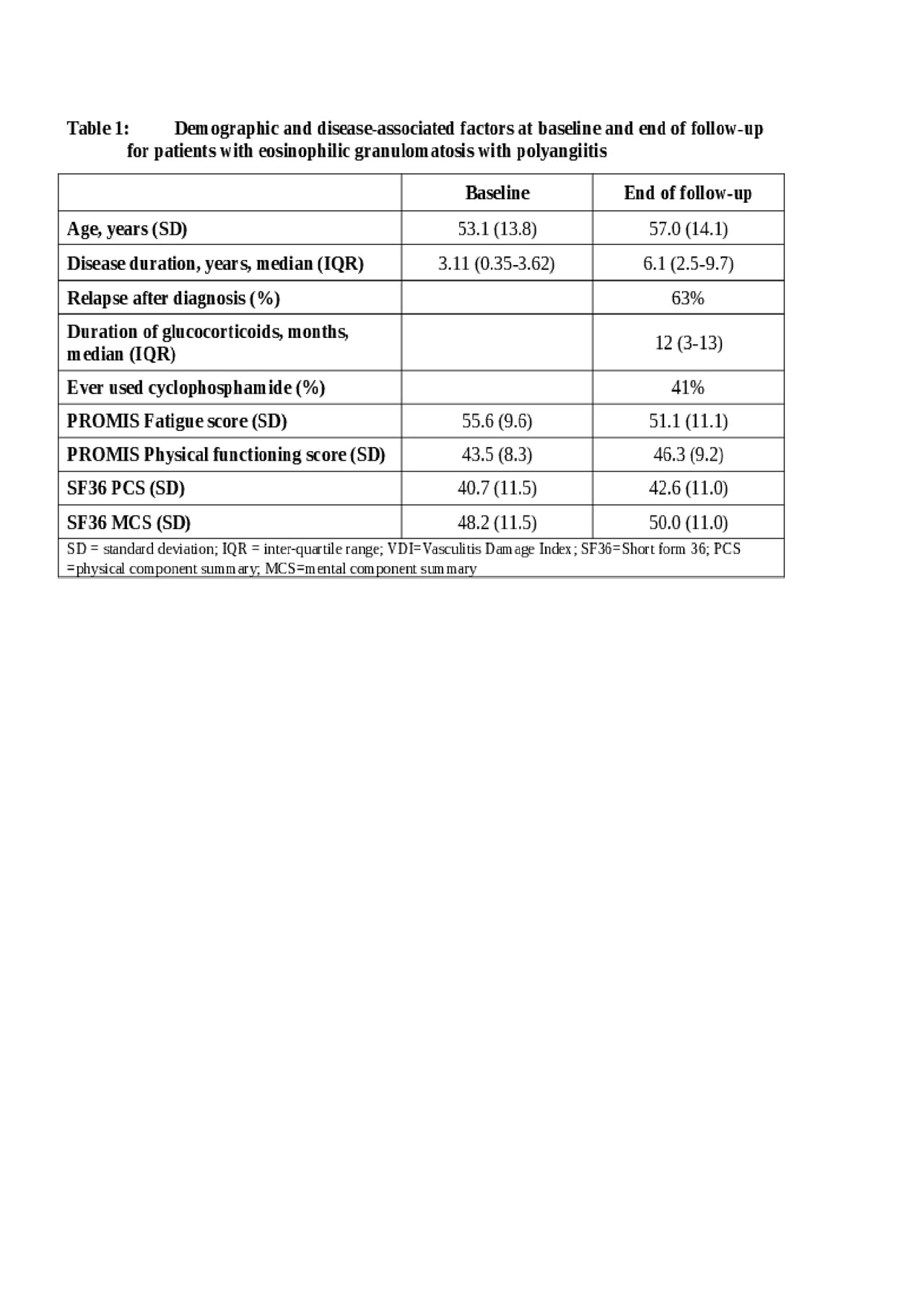Session Information
Session Type: Poster Session (Monday)
Session Time: 9:00AM-11:00AM
Background/Purpose:
Eosinophilic granulomatosis with polyangiitis (EGPA) is characterized by asthma and other manifestations of vasculitis, some of which can be life-threatening, cause major organ damage, or become chronic. Data on health-related quality of life (HRQoL) and patient-reported outcomes (PRO) in EGPA are limited. This study aimed to describe HRQoL in patients with EGPA enrolled in a large cohort.
Methods:
Retrospective analysis of HRQoL in patients with EGPA participating in a multicenter longitudinal study from 2003-2019. Demographic and disease-associated factors at baseline include age, sex, ANCA status, use of cyclophosphamide or not, and cumulative duration of glucocorticoid (GC) use. Fatigue and physical functioning were assessed using the Patient-Reported Outcomes Measurement Information System (PROMIS) instruments administered through computer adaptive testing (CAT). PROMIS instruments are calibrated so that scores are normally distributed with a mean of 50 and a standard deviation of 10 in the US population. Higher scores signify better physical functioning and increased fatigue. HRQoL was assessed with the SF36 with physical component summary (PCS) and mental component summary (MCS) scores calculated. SF36 summary scores are calibrated so that scores are normally distributed with a mean of 50 and a standard deviation of 10 in the US population. Continuous and categorical variables are presented as a percentage and continuous variable presented as means with standard deviations or medians with inter-quartile range (IQR). The association of demographic and disease-related factors with PROMIS and SF-36 measures were assessed at the end of follow-up using general linear models. Results are presented as an increase in measures per one unit increase in the predictor variables.
Results: Data from 276 patients with EGPA were included; 57% were female, with a mean age of 53.1 years (SD ±13.8) years. The median duration of follow-up was 3.1 (IQR 0.9-6.2) years. Table 1 shows demographic and disease-associated factors. At baseline, fatigue and physical functioning was assessed among 66 study patients and 151 patients at the end of follow-up. SF36 was assessed among all patients at baseline and at the end of follow-up. At baseline, patients had substantially increased fatigue scores 55.6 (SD 9.6) and reduced physical functioning scores 43.5 (SD 8.3) compared to the general population. The mean SF36 PCS scores were quite low 42.6 (11.0) but the mean SF36 MCS scores were the same as the population norm, 50.0 (11.0). At the end of follow-up, scores were closer to the population norms (Table 1). At the end of follow-up, female sex was associated with a 4.6 point higher fatigue score (p=0.01) and age was associated with reduced physical functioning and PCS and with reduction of 0.17 (p=0.001) and 0.16 (p < 0.001) for one-year increase in age, respectively (Table 2).
Conclusion:
Compared to the general population, patients with EGPA have an increase in fatigue, reduced physical functioning, and substantially reduced HRQoL.
To cite this abstract in AMA style:
Tomasson G, Pagnoux C, Cuthbertson D, Carette S, Khalidi N, Koening C, Langford C, McAlear C, Moreland L, Monach P, Seo P, Sreih A, Ytterberg S, Merkel P. Assessments of Quality of Life in Patients with Eosinophilic Granulomatosis with Polyangiitis [abstract]. Arthritis Rheumatol. 2019; 71 (suppl 10). https://acrabstracts.org/abstract/assessments-of-quality-of-life-in-patients-with-eosinophilic-granulomatosis-with-polyangiitis/. Accessed .« Back to 2019 ACR/ARP Annual Meeting
ACR Meeting Abstracts - https://acrabstracts.org/abstract/assessments-of-quality-of-life-in-patients-with-eosinophilic-granulomatosis-with-polyangiitis/


